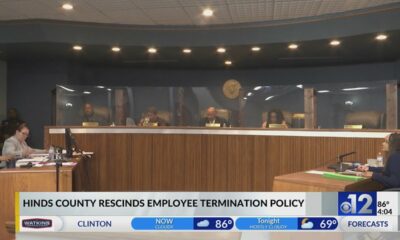Mississippi Today
Gov. Reeves signs racially divisive HB 1020; Legal challenge could loom
Gov. Reeves signs racially divisive HB 1020; Legal challenge could loom
Legislation that would create a separate judicial district within Jackson, the state's capital and largest city, was signed into law Friday by Gov. Tate Reeves.
Reeves had indicated earlier in the week he would sign the legislation.
House Bill 1020 generated national attention by creating a separate judicial district in the whiter and more affluent areas of Jackson, the nation's Blackest large city. Judges in the district will be appointed by the white chief justice of the Supreme Court instead of elected by the majority Black voters.
There are questions about the constitutionality of the bill. Many have speculated it would be challenged in court because it takes the right to elect judges away from the citizens of Hinds County. The Mississippi Constitution calls for judges to be elected, though there are examples where judges are appointed on a temporary basis by the Supreme Court chief justice. Whether House Bill 1020 creates an allowable exception for usurping the electoral rights of Hinds County citizens could be decided by the courts.
The final version of the bill sent to the governor watered down the more controversial aspects of the legislation as it was introduced during the 2023 session, but it still garnered the support of only one of the 53 African American members of the Legislature.
Jackson legislators conceded the city needed help with its spiraling crime problem, but said the proposal that passed the Legislature and was signed Friday by the governor created more problems than it solved.
Debate on the proposal in both the House and Senate was racially raw.
“When you take away the right of people to elect their officials who have traditionally been elected, how else are they going to see it?” asked Rep. Ed Blackmon, a Democrat from Canton. “ … The right to vote may not mean much to some of you, but when you look at history that got us to where we are today, when it took so long and lost so many lives … ”
READ MORE: Mississippi's racial divides were on full display as HB 1020 got its final debate and passing vote
Rep. Trey Lamar, R-Senatobia, the author of the legislation, said his sole intent was to help the city of Jackson and said he resented that he was made to look like his intent was racially motivated intense during debate on the House floor.
“Gentleman, you have not been beaten for asking for the right to vote,” Blackmon said to Lamar. “You have not been locked up for asking for that. I have. Yes, I am sensitive to that.”
Rep. Nick Bain, a Republican from Corinth, said he had heard from many Jacksonians who said they wanted help with crime issues facing the city.
“This is the capital city of Mississippi,” Bain said. “It belongs to each and every one of us in this room.”
He said the legislation was intended to provide that help, not to create racial divides.
In a news release, Reeves said, “This legislation won't solve the entire problem, but if we can stop one shooting, if we can respond to one more 911 call – then we're one step closer to a better Jackson. I refuse to accept the status quo. As long as I'm governor, the state will keep fighting for safer streets for every Mississippian no matter their politics, race, creed, or religion – regardless of how we're portrayed by liberal activists or in the national media.”
The bill creates a separate judicial and law enforcement district within the Capital Complex Improvement District. Four judges will be appointed by Chief Justice Michael Randolph, who is white and from Hattiesburg in south Mississippi. An additional court would be created within the district to hear misdemeanor cases and to conduct preliminary hearings in felony cases.
Unlike the original version of House Bill 1020, the specially appointed judges would be for a set period of time — through 2026 — instead of being in place permanently.
The legislation gives the state Department of Public Safety the authority to send to prison those convicted of misdemeanor crimes that carry jail time. Normally such sentences are served in local jails.
The bill also provides more prosecuting attorneys and public defenders.
Companion legislation — Senate Bill 2343 —also was signed by the governor. The bill would expand the jurisdiction of a state police force both in the Capitol Complex Improvement District and the city overall. That bill also is expected to be signed.
The legislation gives a state police force primary jurisdiction within the Capitol Complex and secondary jurisdiction throughout the city.
The state is expected to have 150 state law enforcement officers patrolling in Jackson.
This article first appeared on Mississippi Today and is republished here under a Creative Commons license.
Mississippi Today
On this day in 1983


May 6, 1983

A federal judge sentenced Raymond Bledsoe to life for beating Black jazz saxophonist Steven Harvey to death in a Kansas City park because of his race.
A Missouri jury had acquitted Bledsoe of murder, and afterward, he reportedly bragged to his girlfriend about killing a “n—–” and getting away with it.
Harvey's family members, Alvin Sykes and the Steve Harvey Justice Campaign convinced federal authorities to pursue the case. At the time, the conviction was reportedly the fourth under the Civil Rights Act of 1968.
In 2013, federal corrections authorities denied parole to Bledsoe. To date, he remains the longest serving inmate convicted under that Civil Rights Act.
Sykes later helped bring about both the Justice Department's reopening of the Emmett Till case and the passage of the Emmett Till Unsolved Civil Rights Crime Act.
Sykes died in 2021, and his New York Times obituary read, “Though he never took a bar exam, Mr. Sykes was a brilliant legal and legislative operator whose admirers included City Council members, politicians and U.S. attorneys general from both parties. … He led a monk's life in the name of social justice. He rarely held a job, wore second hand clothing and lacked a permanent address for long stretches of time, staying with friends instead and living off donations and, later, speaker fees. He never learned to drive and so walked everywhere, most often to the reference section of the library in Kansas City, Missouri, where he did his research, or to a booth at a restaurant that he used as an informal office, his papers surrounded by cups of coffee and stubbed-out cigarettes.”
This article first appeared on Mississippi Today and is republished here under a Creative Commons license.
Mississippi Today
Podcast: How the 2024 Medicaid expansion debate died

Mississippi Today's Adam Ganucheau, Bobby Harrison, Geoff Pender, and Taylor Vance discuss the breakdown of Medicaid expansion negotiations in the Legislature.
This article first appeared on Mississippi Today and is republished here under a Creative Commons license.
Did you miss our previous article…
https://www.biloxinewsevents.com/?p=355689
Mississippi Today
On this day in 1917
May 5, 1917

Eugene Jacques Bullard became the first Black American combat pilot.
After the near lynching of his father and hearing that Great Britain lacked such racism, the 12-year-old Georgia native stowed away on a ship headed for Scotland. From there, he moved to Liverpool, England, where he handled odd jobs before becoming a boxer, traveling across Europe before he settled in Paris.
“It seems to me that the French democracy influenced the minds of both White and Black Americans there and helped us all to act like brothers as near as possible,” he said. “It convinced me, too, that God really did create all men equal, and it was easy to live that way.”
When World War I began, he was too young to fight for his adopted country, so he and other American expatriates joined the French Foreign Legion. Through a series of battles, he was wounded, and doctors believed he would never walk again.
No longer able to serve in the infantry, an American friend bet him $2,000 that he could not get into aviation. Taking on the challenge, he earned his “wings” and began fighting for the French Aéronautique Militaire.
He addressed racism with words on his plane, “All Blood Runs Red,” and he nicknamed himself, “The Black Swallow of Death.”
On his flights, he reportedly took along a Rhesus monkey named “Jimmy.” He tried to join the U.S. Air Service, only to be turned away because he was Black. He became one of France's most decorated war heroes, earning the French Legion of Honor.
After the war he bought a Paris nightclub, where Josephine Baker and Louis Armstrong performed and eventually helped French officials ferret out Nazi sympathizers. After World War II ended, he moved to Harlem, but his widespread fame never followed him back to the U.S.
In 1960, when French President Charles de Gaulle visited, he told government officials that he wanted to see his old friend, Bullard. No one in the government knew where Bullard was, and the FBI finally found him in an unexpected place — working as an elevator operator at the Rockefeller Center in New York City.
After de Gaulle's visit, he appeared on “The Today Show,” which was shot in the same building where he worked.
Upon his death from cancer in 1961, he was buried with honors in the French War Veterans' section of the Flushing Cemetery in Queens, New York.
A sculpture of Bullard can be viewed in the Smithsonian National Space and Air Museum in Washington, D.C., a statue of him can be found outside the Museum of Aviation, and an exhibit on him can be seen inside the National Museum of the U.S. Air Force, which posthumously gave him the rank of a second lieutenant. He is loosely portrayed in the 2006 film, “Flyboys.”
This article first appeared on Mississippi Today and is republished here under a Creative Commons license.
-
SuperTalk FM4 days ago
Driver’s education set to become mandatory in Mississippi as bill passes
-
SuperTalk FM3 days ago
State approves $160M to expand Highway 7 to four lanes in Lafayette County
-
Mississippi Business6 days ago
Geartek expanding operations in Alcorn County
-
Mississippi News6 days ago
Two women accused of shoplifting across southeast captured in Mississippi
-
Mississippi News4 days ago
Altercation at Mississippi police department leads to officer-involved shooting
-
Mississippi News1 day ago
Winston Co. Sheriff’s Office investigates shooting at Dave’s Club
-
Mississippi News6 days ago
Starkville police make arrest in shooting at Dawg Wash South
-
Our Mississippi Home6 days ago
Make Your Taco Tuesday Healthy With More Fiber










































